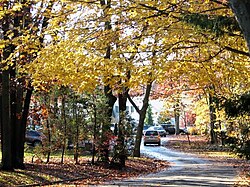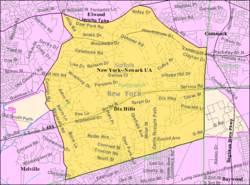Dix Hills
| Dix Hills, New York | |
|---|---|
| Hamlet and census-designated place | |

A house in Dix Hills in October 2009.
|
|
 U.S. Census map |
|
| Location within the state of New York | |
| Coordinates: 40°47′46″N 73°20′4″W / 40.79611°N 73.33444°WCoordinates: 40°47′46″N 73°20′4″W / 40.79611°N 73.33444°W | |
| Country | United States |
| State | New York |
| County | Suffolk |
| Area | |
| • Total | 15.9 sq mi (41.3 km2) |
| • Land | 15.9 sq mi (41.3 km2) |
| • Water | 0.0 sq mi (0.0 km2) |
| Elevation | 203 ft (62 m) |
| Population (2010) | |
| • Total | 26,892 |
| • Density | 1,700/sq mi (650/km2) |
| Time zone | Eastern (EST) (UTC-5) |
| • Summer (DST) | EDT (UTC-4) |
| ZIP code | 11746 |
| Area code(s) | 631 |
| FIPS code | 36-20687 |
| GNIS feature ID | 1867400 |
Dix Hills is a hamlet and census-designated place (CDP) on Long Island in the town of Huntington in Suffolk County, New York, United States. The population was 26,892 at the 2010 census. In 2008, Dix Hills was named one of the most affluent U.S. neighborhoods by Forbes.
According to the United States Census Bureau, the CDP of Dix Hills has a total area of 15.9 square miles (41.3 km2), all of it land. The town of Huntington, of which Dix Hills is a part, has a total area of 137.1 square miles (355.1 km2), of which 94.1 square miles (243.8 km2) is land and 43.0 square miles (111.3 km2), or 31.35%, is water.
Dix Hills is located centrally on Long Island, on the south edge of Huntington, bordering the town of Babylon. The Long Island Expressway cuts almost straight through the middle of the hamlet.
Settlers traded goods with the indigenous Secatogue tribe for the land that became Dix Hills in 1699. The Secatogues lived in the northern portion of the region during the later half of that century. The land was known as Dick's Hills. By lore, the name traces to a local native named Dick Pechegan, likely of the Secatogues. Scholar William Wallace Tooker wrote that the addition of the English name "Dick" to the indigenous name "Pechegan" was a common practice. Tooker wrote that Pechegan's wigwam and his planted fields became the hilly area's namesake, known as the shortened "Dix Hills" by 1911. The area was mostly used for farming until after World War II.
Dix Hills is served by the Half Hollow Hills Central School District and the Commack School District. The Half Hollow Hills elementary schools are Chestnut Hill (closed), Forest Park (closed), Otsego, Paumanok, Signal Hill, Sunquam, and Vanderbilt. The middle schools that serve the district are Candlewood Middle School and West Hollow Middle School. The high schools are Half Hollow Hills High School East and Half Hollow Hills High School West. Commack Middle School and Rolling Hills Elementary are both a part of the Commack School District and are located within Dix Hills. Commack High School is ranked as the 95th best school in the country.Five Towns College is also located within Dix Hills. Dix Hills has a Half Hollow Hills Community Library.
...
Wikipedia

